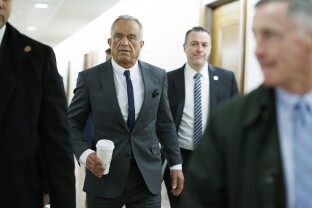The White House is downplaying the “Make America Healthy Again” Commission report’s citation issues, even as it scrambles to fix them.
A NOTUS investigation published Thursday found that at least seven of the report’s citations appeared to not actually exist. The White House publicly blamed any problems with the report on “formatting issues.”
Hours later, a new version of the MAHA report was published on the White House website with all seven of those citations replaced — five with completely different references and two with references to real studies written by the same authors of the nonexistent earlier citations.
While the replacement references all appear to be to real sources, it’s not immediately clear whether they all support the claims the report is making.
The study included in the original report supposedly written by epidemiologist Katherine Keyes, for example, was replaced with a link to an article from KFF Health News on a similar topic.
The two nonexistent studies linking direct-to-consumer advertising to the rise in prescription medication use in children were replaced with links to a 2013 New York Times article about ADHD medications and a 2006 study titled, “Trends in the Use of Psychotropic Medications Among Adolescents, 1994 to 2001.”
And the mysterious study by pediatric pulmonologist Harold J. Farber titled “Overprescribing of oral corticosteroids for children with asthma”? It was replaced by one of Farber’s real publications, a study titled “Oral Corticosteroid Prescribing for Children With Asthma in a Medicaid Managed Care Program.”
The new version of the report also swapped citations that NOTUS identified as being misinterpreted in the original. A study that was originally cited to back up the report’s claim that psychotherapy can be as effective as psychotherapeutic drugs in the short term was replaced with another study after one of the first study’s authors told NOTUS that their research didn’t actually include psychotherapy as one of its conditions.
But even as changes take place behind the scenes, members and representatives of the Trump administration have continued to insist they still have faith in Health Secretary Robert F. Kennedy Jr.’s vision of “gold-standard science.”
“Minor citation and formatting errors have been corrected, but the substance of the MAHA report remains the same — a historic and transformative assessment by the federal government to understand the chronic disease epidemic afflicting our nation’s children,” Health and Human Services spokesperson Emily Hilliard told NOTUS in a statement. “Under President Trump and Secretary Kennedy, our federal government is no longer ignoring this crisis, and it’s time for the media to also focus on what matters.”
Another administration source stood by the report. “Citation issues happen all the time,” they told NOTUS. “The bulk of the report is still factually accurate — nothing changes in the report.”
And at a White House press conference Thursday afternoon, press secretary Karoline Leavitt said that the White House still has “complete confidence in Secretary Kennedy and his team at HHS” and that the citation errors don’t negate the substance of the report.
But, Leavitt added, she couldn’t comment on whether HHS used AI tools when drafting the MAHA report. HHS also didn’t provide any comment on whether its staff used AI.
—
Margaret Manto is a NOTUS reporter and an Allbritton Journalism Institute fellow. Violet Jira contributed reporting for this story.
Sign in
Log into your free account with your email. Don’t have one?
Check your email for a one-time code.
We sent a 4-digit code to . Enter the pin to confirm your account.
New code will be available in 1:00
Let’s try this again.
We encountered an error with the passcode sent to . Please reenter your email.


